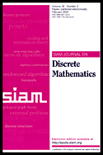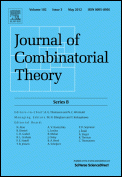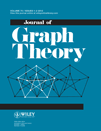
Journal of Integer Sequences
Scope & Guideline
Exploring the Infinite: Unraveling the Mysteries of Integer Sequences
Introduction
Aims and Scopes
- Study of Integer Sequences:
The journal publishes research that investigates properties, patterns, and applications of integer sequences, including classical sequences like Fibonacci and Lucas numbers. - Combinatorial Analysis:
Many papers explore combinatorial structures related to integer sequences, such as compositions, partitions, and tilings, contributing to the understanding of how sequences can be represented and manipulated. - Recurrence Relations and Generating Functions:
A significant focus is on developing and analyzing recurrence relations and generating functions that define or relate to integer sequences, providing deeper insights into their behavior. - Number Theoretic Applications:
The journal includes research that connects integer sequences to number theory, including divisibility properties, congruences, and relations with prime numbers. - Graph Theory and Combinatorial Structures:
Papers often bridge integer sequences with graph theory, exploring how sequences can model graph properties and combinatorial configurations.
Trending and Emerging
- Advanced Combinatorial Techniques:
There is a growing emphasis on sophisticated combinatorial techniques and identities involving integer sequences, indicating a trend towards deeper combinatorial explorations. - Connections with Algebra and Geometry:
Recent papers are increasingly linking integer sequences with algebraic structures and geometric interpretations, suggesting an interdisciplinary approach to sequence analysis. - Computational Methods and Algorithms:
The incorporation of computational techniques and algorithms for analyzing integer sequences is on the rise, reflecting the importance of computational mathematics in contemporary research. - Applications in Probabilistic and Statistical Models:
Emerging themes include the use of integer sequences in probabilistic models and statistical analysis, showcasing their relevance in broader mathematical contexts. - Exploration of New Sequence Families:
There is a trend towards discovering and characterizing new families of integer sequences, driven by both theoretical curiosity and practical applications.
Declining or Waning
- Elementary Number Theory:
While still present, the focus on basic elementary number theory related to integer sequences has decreased, possibly due to the increasing complexity and specialization of topics. - Historical Perspectives:
Research that centers on historical or philosophical perspectives of integer sequences has waned, as the journal shifts towards more contemporary mathematical applications and theoretical advancements. - Basic Sequence Generation Techniques:
There seems to be a decline in publications focused solely on basic methods of generating integer sequences, as researchers increasingly prefer to explore more complex and nuanced relationships.
Similar Journals

ARS Mathematica Contemporanea
Advancing the Frontiers of Mathematical KnowledgeARS Mathematica Contemporanea, published by UP FAMNIT in Slovenia, stands as a pivotal journal within the fields of algebra, number theory, discrete mathematics, geometric topology, and theoretical computer science. Since its inception in 2011, this journal has consistently provided a rich platform for innovative research, garnering a commendable Q2 category ranking in various mathematical domains, including Algebra and Number Theory, and Geometry and Topology, showcasing its growing influence and prestige in the academic community. With an increasing Scopus rank—particularly notable in Algebra and Number Theory at the 71st percentile—ARS Mathematica Contemporanea is dedicated to publishing high-quality, peer-reviewed content that advances the frontiers of mathematical knowledge. The journal’s commitment to open access ensures that valuable research is readily available to scholars, practitioners, and students alike, fostering collaboration and dissemination of ideas across the globe. As it converges towards its dedicated timeline extending to 2024, ARS Mathematica Contemporanea remains a crucial resource for those engaged in mathematical research, presenting an array of theoretical and practical insights that define contemporary mathematical discourse.

FIBONACCI QUARTERLY
Illuminating the World of Algebra and Number TheoryFibonacci Quarterly is a notable journal published by the Fibonacci Association, focusing on the captivating realms of mathematics and its applications, particularly Algebra and Number Theory. With its ISSN 0015-0517, the journal serves as a vital platform for the dissemination of original research and innovative ideas within its field. Established in the United States and operating since its inception, the journal covers an extensive timeline of contributions from 1996 to 2008 and continues its journey of academic excellence with ongoing publications through 2024. Currently ranked in the Q3 category for Mathematics (Algebra and Number Theory) as of 2023, Fibonacci Quarterly has established itself as an essential resource for researchers and practitioners alike, despite its modest Scopus rank of #91 out of 119 with a 23rd percentile ranking. Although not an open-access journal, it provides crucial insights and advancements that fuel scholarly discussions and foster academic growth in the mathematical community. Whether you are a researcher, a professional, or a student, Fibonacci Quarterly offers a wealth of knowledge that enriches the understanding of number theory and algebra, making it an indispensable resource in the pursuit of mathematical clarity and innovation.

Journal of the Ramanujan Mathematical Society
Advancing Research in the Footsteps of RamanujanJournal of the Ramanujan Mathematical Society, published by the esteemed Ramanujan Mathematical Society, serves as a vital resource for researchers and professionals in the field of mathematics. With an ISSN of 0970-1249 and an E-ISSN of 2320-3110, this journal specializes in disseminating high-quality research and advancements in various domains of mathematics, particularly those that echo the legacy of the renowned mathematician Srinivasa Ramanujan. Since its inception in 2006, this journal has evolved to embrace a diverse range of mathematical topics, striving for excellence as evidenced by its current Q3 ranking in the mathematics (miscellaneous) category for 2023. Although it is not an open-access journal, the Journal of the Ramanujan Mathematical Society remains a cornerstone for those engaged in the academic study of mathematics, as it appears in Scopus with a rank of #343/399. As it continues its publication journey towards 2024, the journal aims to foster a vibrant community of scholars and practitioners who contribute to the evolving landscape of mathematical research.

Advances and Applications in Discrete Mathematics
Connecting Ideas, Inspiring Innovations in Discrete MathematicsAdvances and Applications in Discrete Mathematics, published by PUSHPA PUBLISHING HOUSE, is a premier journal dedicated to the flourishing field of discrete mathematics. With a focus on both the theoretical aspects and practical applications, this journal serves as a valuable resource for researchers, professionals, and students aiming to explore cutting-edge developments in areas such as combinatorics, graph theory, and algorithms. Although specific impact factors have yet to be established, its commitment to quality scholarship is reflected in its rigorous peer-review process, ensuring that published articles meet high academic standards. The journal encourages open access to disseminate knowledge effectively, fostering collaboration and innovation within the discrete mathematics community. As a vital platform for researchers wishing to contribute to this dynamic field, Advances and Applications in Discrete Mathematics plays a critical role in promoting advancements and applications that are essential to both theoretical exploration and practical problem-solving.

Contributions to Discrete Mathematics
Pioneering insights in combinatorial research.Contributions to Discrete Mathematics, published by the Department of Mathematics and Statistics at the University of Calgary, serves as a vital platform for disseminating innovative research within the dynamic field of discrete mathematics and combinatorics. Established in 2008, this journal has rapidly gained recognition, currently holding a Q3 classification in discrete mathematics and combinatorics for 2023. As it aims to foster academic dialogue and share groundbreaking discoveries, the journal showcases high-quality peer-reviewed articles that cover a range of topics, from theoretical explorations to practical applications. Although it currently operates under a traditional subscription model, there is a growing commitment to enhancing access options, ensuring that critical knowledge is available to researchers and practitioners alike. With its notable Scopus ranking of #50 out of 92 within its category, this journal is positioned as an important resource for students, academics, and industry professionals who seek to stay at the forefront of discrete mathematics research.

SIAM JOURNAL ON DISCRETE MATHEMATICS
Advancing the frontiers of discrete mathematics.SIAM Journal on Discrete Mathematics is a premier academic journal dedicated to the publication of high-quality research in the field of discrete mathematics. Published by SIAM Publications, this journal features original research articles covering a broad range of topics, including combinatorial optimization, graph theory, and algorithm design. With an impressive impact factor placing it in the top quartile (Q1) of mathematics journals, it is a valuable resource for researchers and practitioners looking to stay abreast of the latest advancements in discrete mathematics. Although currently not open access, the journal commits to disseminating rigorous and impactful findings that advance the understanding of mathematical concepts and their applications in various scientific domains. Renowned for its rigorous peer-review process, the SIAM Journal on Discrete Mathematics serves as an essential platform for scholars aiming to contribute to this evolving field, making it a must-read for anyone involved in mathematical research.

ELECTRONIC JOURNAL OF COMBINATORICS
Advancing the Frontiers of Combinatorial MathematicsELECTRONIC JOURNAL OF COMBINATORICS, an esteemed publication in the field of combinatorial mathematics, has been a significant platform for innovative research since its inception in 1996. Published by the ELECTRONIC JOURNAL OF COMBINATORICS, this open-access journal has made its complete repository freely available since 2014, encouraging broad international collaboration and dissemination of knowledge. The journal maintains a robust reputation, boasting various category quartiles including Q1 rankings in Applied Mathematics and Discrete Mathematics, highlighting its importance in advancing research and applications in these critical fields. With a clear commitment to showcasing high-impact work and contributing to the ongoing discourse in computational theories, the journal appeals to researchers, professionals, and students alike. Scholars can access a wide array of rigorous articles that explore the latest trends and developments in combinatorial techniques, geometry, and topology, making this journal an essential resource for anyone vested in mathematical sciences. For more information, please refer to their office based at the University of Delaware, Department of Mathematical Sciences.

Annals of Combinatorics
Pioneering Insights in Combinatorial ResearchAnnals of Combinatorics, published by Springer Basel AG, serves as a premier platform for innovation and research in the field of discrete mathematics and combinatorics. With an ISSN of 0218-0006 and an E-ISSN of 0219-3094, the journal captures the ongoing developments and breakthroughs that characterize this dynamic discipline, which plays a crucial role in various applications such as computer science, optimization, and statistical mechanics. The journal has been recognized as part of the Q2 category in the 2023 rankings for discrete mathematics and combinatorics, reflecting its significant contribution to the academic community. Researchers and educators alike benefit from its insightful articles that not only cover theoretical advancements but also practical implications. With convergence years spanning from 2005 to 2024, the Annals of Combinatorics continues to be an essential resource for anyone looking to deepen their understanding and explore new frontiers in combinatorial research.

JOURNAL OF COMBINATORIAL THEORY SERIES B
Fostering Collaboration in Combinatorial TheoryJOURNAL OF COMBINATORIAL THEORY SERIES B, published by Academic Press Inc., Elsevier Science, is an esteemed journal within the discipline of combinatorial theory, discrete mathematics, and theoretical computer science. With a rich history since its inception in 1971 and ongoing publication through 2025, this journal has established itself as a pillar in its field, currently holding Q1 category rankings in multiple areas including Computational Theory and Mathematics, Discrete Mathematics and Combinatorics, and Theoretical Computer Science. The journal features cutting-edge research and developments, attracting contributions from both established professionals and emerging scholars. Despite the absence of an open access option, the journal's strong impact reflected in its Scopus ranks—such as being number 16 out of 92 in Discrete Mathematics and Combinatorics (83rd percentile)—signifies its influential role in advancing knowledge and innovation. Researchers seeking to share impactful findings and connect with a vibrant academic community will find the JOURNAL OF COMBINATORIAL THEORY SERIES B an essential resource.

JOURNAL OF GRAPH THEORY
Charting New Paths in Mathematical ResearchJOURNAL OF GRAPH THEORY, published by WILEY, stands as a pivotal resource in the fields of Discrete Mathematics and Combinatorics, as well as Geometry and Topology. Since its inception in 1977, this esteemed journal has fostered the dissemination of influential research, currently categorized in the prestigious Q1 quartile according to the latest metrics for 2023. With an ISSN of 0364-9024 and an E-ISSN of 1097-0118, it caters to a global readership of researchers, professionals, and students dedicated to advancing their knowledge in graph theory. By maintaining a strong rank in Scopus—39th out of 106 in Geometry and Topology, and 38th out of 92 in Discrete Mathematics and Combinatorics—it reflects its significance and impact within the academic community. Although it does not offer open-access options, its rigorous peer-review process ensures that only high-quality original research is published, thus reinforcing its reputation as a leading journal in this mathematical domain.